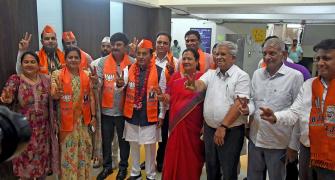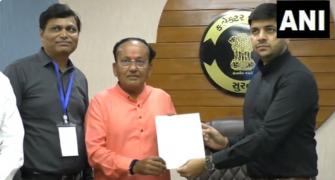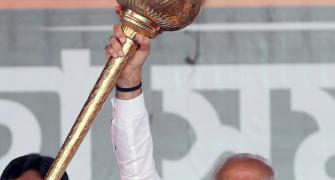Of the two posts he had held, he would naturally, and understandably, prefer the chief ministership Even for a rabble-rousing firebrand, the Opposition Leader's office is the best only when the worst happens -- loss of power. The revenue minister's post was a stop-gap for a man who wore his ambitions on his sleeve, swaggered to Delhi at the drop of a hat, confabulated with anti-Vilasrao Deshmukh coteries close to Sonia Gandhi.
And three years of that wait since he left the Shiv Sena was too long for a man who had anticipated a quick rise to the top slot. In his haste to get there, he made suicidal mistakes. Rane forgot that however useful a person is in the Congress party, that organisation prefers courtiers who bow and beg and not those who demand. The high command does not ever want to appear that it has been bullied into meeting a desire.
Today, he stands painted into a corner, the paint brush in held in his one hand, the can of paint in the other. The Congress party has not only cut him down to size in the latest re-jig of the organisational wing but virtually put him away. He does not know if he should attend the weekly cabinet meeting on Thursday where he would have to vote to approve the minutes of the sitting which gifted away prime urban land to the Dhoots of Videocon for an LED TV screen project.
Upset with Deshmukh, Narayan Rane threatens to quit
The wishful in the Sena would like to see him scamper back to its fold, not because it wants him but only to savour his ultimate humiliation, but the party has no room for renegades. The BJP has no place for him for it would irk the saffron ally. His entry into the Nationalist Congress Party is likely but not certain; the NCP could also suffer his impatience and is unlikely to ever offer the top slot for others in the party would rebel. The other option is much difficult to execute -- start a new party.
Even in the Congress party and the cabinet, Rane has been more of an intra-party and intra-ruling elite's own outspoken Opposition leader. He has often let the world know that he was ill-disposed towards Vilasrao Deshmukh and as he has been saying of late, the chief minister's ways. He found the incumbent far too namby-pamby and on a drift instead of being focused primarily on issues that can do good for Maharashtra and win the next round of elections for the party.
Though he had handed in his papers to Sonia Gandhi on July 3, Rane waited till the issue of allotment of land to Videocon came up. That's a cause with a lot of mileage; there's a lot of juice to be extracted. Expensive land, well within the metropolitan region of Mumbai, being given away without even asking others if they too wanted to bid for the plot can make many wonder at the chief minister's motive. Mind it -- he has not made such a big fuss about any other issue.
Rane's calculation was that the Videocon land issue would make Deshmukh stink and he would himself emerge smelling of roses. Sale of a swathe of land worth some Rs 3,000 crores to Rs 4,000 crores -- he should know, being revenue minister land is his daily cereal -- would make people strongly suspect venality. He has let everyone know that when Vilasrao Deshmukh rammed it down the cabinet's throat saying the Dhoots would take their project elsewhere, even China, he opposed it tooth and nail. And one of the Dhoots, Rajkumar Dhoot, is a Shiv Sena MP in the Rajya Sabha!
One thing about Rane -- he is no chicken-hearted person. He fights his wars openly and not by proxy. When he quit the Shiv Sena, he did not do it surreptitiously or go in hiding like Chhagan Bhujbal did in 1990. His split was quite brazen to the extent that he stood on the lawns of his Madam Cama Road bungalow and even claimed that he did not fear violence from Shiv Sainiks. All violence engineered in the past, he had claimed, had had his hand in it!
He said what he wanted without hesitation, provoked the Sena leadership no end but did not get hurt like other Sena renegades did in the past. He told the Congress that he wanted the top job and openly lobbied for it, unlike the soft-stepping Congressmen who traditionally suck up to the high command and hope to be favoured. Often, he has asked the Congress to let him take up that post. Just like the way he did of Bal Thackeray and got him to replace Manohar Joshi.
Narayan Rane's ambitions in Maharashtra
He went about it meticulously, and openly too. He told Bal Thackeray that he wanted to replace Joshi and even set a timetable. If he was not made chief minister before the last budget was to be presented, he had no interest in the top assignment. A budget, he told Bal Thackeray then, has a chief minister's imprimatur on it and sets out the policy on which a party would contest elections. That was new for Thackeray who does not bother with such niceties of planning, and yielded to the persuasion.
Later, when he left the Shiv Sena and moved to the Congress party, it caused quite some consternation in political circles. Rane assumed that he would be strengthening the party he was joining and weakening the one he was leaving. He had also assumed that he would soon rise to the top post in Maharashtra. However, nothing of that kind happened. Of course, with his entry, Rane only provided a new dimension to the factionalism in the Congress party's state unit, bolstered then state Congress president Prabha Rau's anti-Vilasrao Deshmukh campaign and nothing more.
The Shiv Sena did not suffer much save the loss of a few MLAs who too changed their loyalties along with Rane. The claim that he would wean away more of them from the Sena remained only a promise on which he could not deliver -- at least not till now. If anything weakened the Sena, it was Raj Thackeray's exit from his uncle's party, disgusted that his cousin Uddhav was the favoured one to hold the reins on behalf of Bal Thackeray.
Even that weakness came not immediately after Raj quit the Sena but only when he decided to take up the cause of the Marathi manoos (people) against the daily influx of the Bihari and the Uttar Pradesh bhaiya. It rattled the Sena more than the departure of Raj Thackeray from its ranks, wresting the pro-Marathi plank away from his uncle and cousin. Even now, the elders in the Sena are wondering how to overcome that loss of plank.
Had only -- as some political observers had felt was the best option for him -- Raj Thackeray joined hands with Narayan Rane, the political story of Maharashtra would have been different. Perhaps, then, both the Congress party and the Shiv Sena would have been grievously wounded. In retrospect, Rane perhaps thinks that his due has been denied him and Raj Thackeray assumes his day would come at the cost of the Sena. The former is impatient. The latter is not.







